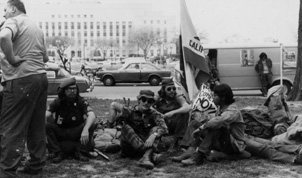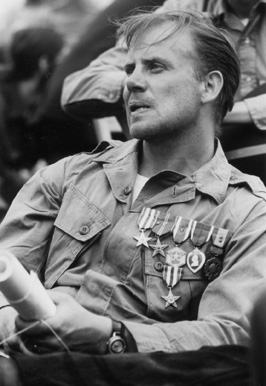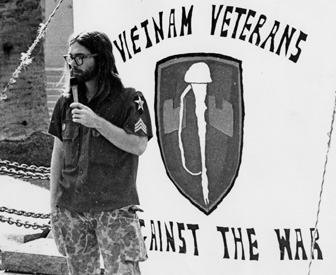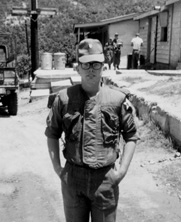 Download PDF of this full issue: v31n1.pdf (13.8 MB)
Download PDF of this full issue: v31n1.pdf (13.8 MB)From Vietnam Veterans Against the War, http://www.vvaw.org/veteran/article/?id=81
 Download PDF of this full issue: v31n1.pdf (13.8 MB) Download PDF of this full issue: v31n1.pdf (13.8 MB) |
These are the times that try men's souls. The summer soldier and the sunshine patriot will in this crisis shrink from the service of his country, but he that stands it now deserves the love and thanks of man and woman.
By 1971 many young men's souls were tried to the limit. We chose to stand with our brothers and sisters still on active duty and those in America struggling against imperialism represented best by the U.S. war in Southeast Asia.
 I believe I was involved in Dewey Canyon III for a slightly different reason than most who were there. I was there to remember and speak for the youngest of our men who had died, not in Southeast Asia, but in the DMZ in Korea. Many of us in the DMZ in 1966 to '67 were there because we were too young to be in Vietnam. I was a squad leader at 18, with many in my squad still 17 years old. Most of the combat squads I led into the zone were understaffed by 50% or more due to the continuing huge buildup in Southeast Asia during that time. The equipment we were issued was outdated so that modern supplies could feed the bigger war.
I believe I was involved in Dewey Canyon III for a slightly different reason than most who were there. I was there to remember and speak for the youngest of our men who had died, not in Southeast Asia, but in the DMZ in Korea. Many of us in the DMZ in 1966 to '67 were there because we were too young to be in Vietnam. I was a squad leader at 18, with many in my squad still 17 years old. Most of the combat squads I led into the zone were understaffed by 50% or more due to the continuing huge buildup in Southeast Asia during that time. The equipment we were issued was outdated so that modern supplies could feed the bigger war.
We lost approximately 15 brothers in combat from our division (2nd Infantry) in the "zone" that 13 months I was there. We received no combat pay or recognition for our services. Their names showed up only in the back pages of the Stars and Stripes. This was a time when forty or more men died every day in Southeast Asia, so you can see we were of little consequence to anyone but ourselves and our families.
At home and back in school, I reunited with my closest friend, Barry, to organize veterans for VVAW to oppose the continuing U.S. war in Southeast Asia. We had enlisted together, why not organize together? Many thousands of miles and local chapters later, we began to mobilize our California chapters for Dewey Canyon III.
We arrived in the DC area and were picked up in a van for transport to the first night's campsite. Rifles and pistols hung from various hooks inside the van. Like ourselves the van driver and his partner riding shotgun were still too close to combat not to have weapons around them, just in case. Those of us in the van from California had taken the position long ago that we would remain armed, but nonviolent. We would defend ourselves if need be.
 The brother that picked us up was saying that many of the active duty military moved into the area to be used against us by the Nixon White House had sent a letter to VVAW saying they would not raise their weapons against us if ordered to do so; in fact, they would turn their guns around. Remember, this was years after grunts began to "frag" their officers. Anything was possible.
The brother that picked us up was saying that many of the active duty military moved into the area to be used against us by the Nixon White House had sent a letter to VVAW saying they would not raise their weapons against us if ordered to do so; in fact, they would turn their guns around. Remember, this was years after grunts began to "frag" their officers. Anything was possible.
The first day in DC, contingents of VVAW members arrived continuously; sometimes one, sometimes ten, sometimes hundreds made their way into camp. All were welcomed with cheers and hugs all around. We were mostly young, but some were old. We were all angry. We were black, white, brown, gay, straight, Catholic, Jewish, Protestant, long-haired and short-haired, all with a common mission: to stand in the service of our country once again against a government that refused to acknowledge the people's demand to stop their imperialist war in Southeast Asia. We were our country's "favorite sons" come home to roost.
That night, the national monuments showed through the trees as planes took off and landed over our heads. The sky was clear and the stars bright. The struggle for unity on action and political line raged fiercely among the young national coordinators from different political perspectives. It was not easy, but unity emerged late in the night.
The next day saw a march to Arlington led by "gold star" mothers who had lost their sons. The anger rose to fever pitch when entrance was denied these brave women who wished only to lay fiowers at the graves of their children. Some tried to scale the gate, others pulled them down and counseled patience. The incursion was to last a week.
Later, time in the halls of Congress to meet with those who claimed to represent us - to demand they honor the memories of our fallen comrades by moving to bring the war to an end. On our way back to camp, a "suit" yelled, "Get a job and make something of yourself!" to a one-armed combat vet who chased the coward into the rotunda and behind the safety of the guards there.
Later on the mall, we set up camp. We were told that the White House said we were not veterans, but impostors, besmirching the good name of veterans. Within an hour, more than a thousand DD214s and discharge papers were collected from those in camp. We knew who we were.
 We learned that the White House had gone to court to have our camp declared illegal and they wanted the DC police to "evict" us. We voted to stay.
We learned that the White House had gone to court to have our camp declared illegal and they wanted the DC police to "evict" us. We voted to stay.
The next day, we captured the Supreme Court for failing in its duty to declare the U.S. war illegal. Vets were arrested, hands on heads as prisoners of war; other vets and supporters hit the streets of DC and the halls of Congress raising more than enough money in just a few hours to make bail for all those arrested.
Individual encounters with school children on field trips, congressional reps on the public dole, young people from all over the United States coming to shut the government down on May Day. We clarified our stand that the war must end.
Finally, the return of our medals. A moment both solemn and emotional, simmering with potential violence for the "lumpen pigs" behind the walls of the capital who we knew were the real criminals. We remembered our fallen brothers and sisters, the innocent Vietnamese, and all others affected badly by this government's war. We wept for our friends, our families and ourselves.
Our medals were for personal acts of heroism and commitment to country and to our comrades in arms - but they were also tainted by the imperialist nature of this war. They had to be returned as one final act of bravery by those who had earned them. I returned my dogtags and the only medal I had been given: my Good Conduct medal. My good conduct during my service years remains my only regret.
I have since grown up, raised my family and become an older man. I remain proud of my service to my country, including Dewey Canyon III, and I am pleased to say that my children have never served in the U.S. military. Honor the warriors, hate the war!
